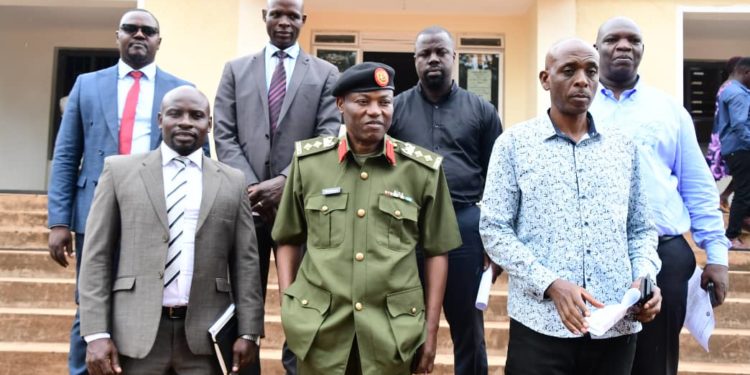In a dramatic change of events, the General Court Martial has dismissed cases against seven top police officers who had been embroiled in a legal battle alongside General Kale Kayihura, the former Inspector General of Police.
The officials, who included Col. Ndahura Atwooki, the former Director of Crime Intelligence, ACP Herbert Muhangi, SSP Nixon Agasirwe, and others, were charged with failing to protect war material and helping and abetting the kidnapping of Rwandan refugees.
The allegations, which stem from August 2018, have been the subject of intense investigation and General court martial disputes, reshaping Uganda’s security and law enforcement landscape.
The lawsuit revolved around serious accusations that the cops had assisted in the kidnapping and wrongful detention of Rwandan refugees. They also came under fire for allegedly failing to protect important military supplies. Three key figures in the police hierarchy, ACP Herbert Muhangi, SSP Nixon Agasirwe, and Col. Ndahura Atwooki, the former Director of Crime Intelligence, stood out among the accused.
However, in an unexpected change of events, the accusations against the commanders were essentially dropped when Army Director of Prosecutions Lt. Col. Rapheal Mugisha issued a withdrawal letter dated March 5, 2024. The decision’s reasoning was puzzling to observers because, remarkably, no clear explanation was given for the abrupt dismissal. The General Court Martial’s exoneration of them is a major turning point in a legal story that has captured public and media interest for more than five years.
Only five months had passed since another unexpected turn of events took place on August 30, 2023 the state chose to drop its accusations against General Kayihura, leaving his subordinates to fight the court system on their own. Notably, the prosecution did not produce a single witness to bolster the allegations against them, which added to the case’s legal complications.
Why were they charged
The seven police officers were the target of severe charges from the prosecution, which claimed that there was a plot that began on October 25, 2013, at Kamengo in the Mpigi District. The charges state that the police planned the kidnapping of Joel Mutabazi, Jackson Kaleemera, and Innocent Kaliisa, three Rwandan refugees, and forced them to be transported against their will to Rwanda in cooperation with their previous supervisor Kale Kayihura.
The eight officers were also accused of illegally supplying weapons to Abudallah Kitatta, the then-leader of the infamous Boda Boda 2010 gang, who did not have the proper authority to possess military-grade weapons. These charges raised questions about accountability and oversight by bringing to light structural flaws in the security system thus threatening the citizens’ peace.
The policemen, including Kayihura, were charged with a serious infraction in an additional indictment of their behavior: failing to furnish a credible report of the weapons provided to speciality police units.
According to reports, those impacted included police units like the Flying Squad, Special Operations Unit, Witness Protection Unit, and Crime Intelligence Directorate Unit. This failure brought to light more significant institutional issues and sparked debate over how vital law enforcement resources are managed.
Even with these serious accusations, the senior police officers who were implicated had a turbulent judicial road. They were detained at the military police barracks in Makindye for months after their arrest before being granted bail and released. Even after their cases, accountability remained. Entangled in the legal maze were Abudallah Kitatta and Detective Constable Sowali Ngobi, his bodyguard. As a result of their illegal possession of firearms and ammunition in May 2019, they were found guilty and sentenced to eight years in jail. Lt. Gen. Andrew Gutti, the court’s chairman at the time, gave the decision.
On July 7, 2020, the Appellant Court Martial, chaired by Elly Turyamubona, rendered a key decision concerning Kitatta and Ngobi’s imprisonment. As the court’s chair, Turyamubona decided to shorten their original ten-year prison term to three years.
He subtracted from this modified term the amount of time they had already spent in detention. The court carefully calculated the reduced sentence for Kitatta and Ngobi, finding that they should have started serving it one year, eight months, and six days from the date of their initial conviction in May 2019.
As a result, taking into account the remission that they were entitled to, it was concluded that they ought to have been released from custody on July 7.
Do you have a story in your community or an opinion to share with us: Email us at editorial@watchdoguganda.com













